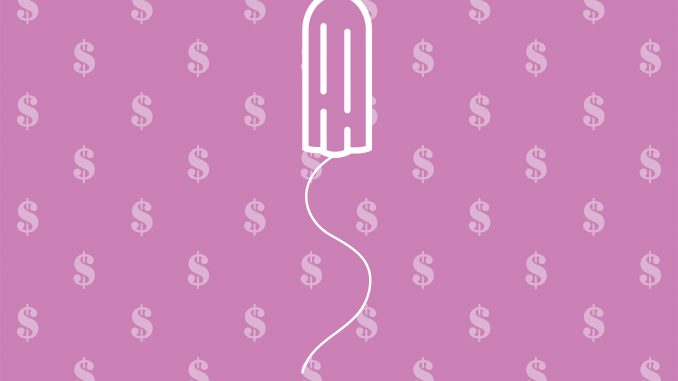

Before I left for college, my grandparents made me a care package that included a copious supply of pads and liners. They knew I wouldn’t be able to rely on my mom for extra when that time of the month rolled around, like I did when I was living at home.
I never thought the care package would run out. But it did, and I was shocked to find out that a large package of pads cost me $12 at the grocery store. I appreciated that care package even more after I realized that being a woman is an investment.
Not everyone has family members who are kind enough to buy them feminine hygiene products, and not everyone can afford them on their own like me. A basic human need shouldn’t have to be a privilege. Having a period isn’t a choice for women, and these hygiene products are as essential as toilet paper, but they are nearly triple the cost and heavily taxed. Tampons are excluded from health supplies, which are typically tax-exempt.
Period poverty is a growing issue. Feminine hygiene products are a $2 billion industry in the United States, according to Time Magazine, and many people are forced to choose between buying sanitary products and other necessities like food. Women who can’t afford pads and tampons end up improvising with other items like tissues, which puts their health at risk.
On Tuesday, the Cherry Pantry, Temple University’s food pantry in the Student Center that helps students combat food insecurity, will begin offering free personal hygiene products, including period supplies.
And thankfully, the Feminist Alliance holds an annual tampon drive, where students can donate spare sanitary products on their way to class. In previous years, the drive went toward Project SAFE, a peer-based advocacy organization of women, non-binary, gender non-conforming and trans people in Philadelphia’s sex trade. It is so important that we donate pads and tampons to organizations like these or other outlets like food banks, so women suffering from poverty have what they need.
Activism like this eases the burden for women who can’t afford the products they need. Sharon Washington, a social and behavioral sciences professor, said this necessity shouldn’t be a burden, especially in public bathrooms.
“Periods are a pivotal part of the sustenance and survival of our species, and these products are as necessary for public engagement as toilet paper and paper towels,” Washington said. “Making them more expensive perpetuates the dominance of the patriarchy, the subjugation of women and economic instability.”
College students know what it’s like to worry about our finances and to hesitate before buying something, but I couldn’t imagine something so vital being out of my reach.
Aly McGrath, a sophomore public health major, has always been able to afford sanitary products. But as a mother, she has had to sacrifice buying brands and products she likes in order to save money.
“I have a couple of friends who have had to either sacrifice certain grocery items in order to afford feminine products or have had to ask me if I can spare some pads,” McGrath said. “They are way overpriced for what they are.”
There should be a systematic approach to making tampons and pads more accessible. After all, they aren’t a luxury product, but some states tax them like they are.
McGrath said the government should offer vouchers for low-income women to get the products they need for their periods.
Last year, California Gov. Jerry Brown signed a bill to provide free period supplies to students in poverty, according to the Sacramento Bee.
I’d like to see a solution like this in Pennsylvania. But until then, the best we can do is donate and spread the word about this issue.
Aside from donating to on-campus drives, there are other organizations around the city doing the same for women in need. Distributing Dignity collects items like bras, pads and tampons. Its Philadelphia drop-off location is on Walnut Street near 16th.
Making period supplies inaccessible for underprivileged women penalizes them not only for being impoverished, but also for being women. It is up to us, who have the privilege of purchasing hygiene products, to help those who do not have the same privilege.



Be the first to comment